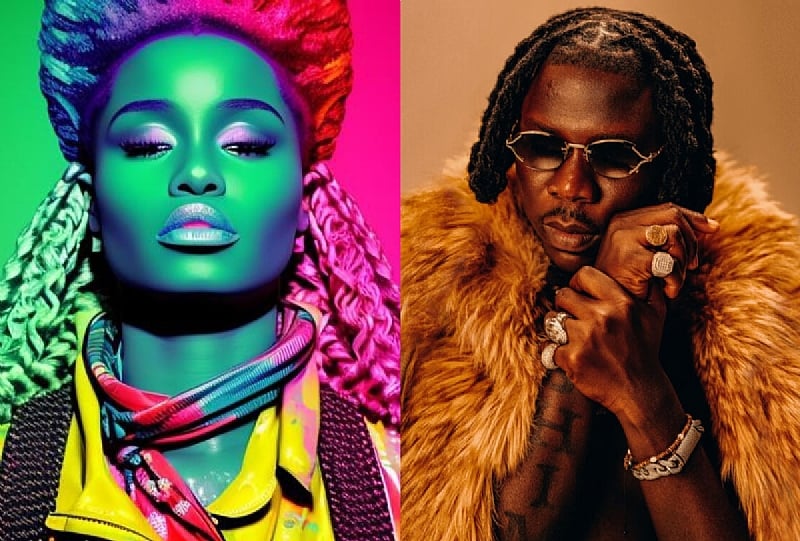Ghanaian dancehall artist Stonebwoy is currently under scrutiny following serious allegations from emerging artist Maddy Maznaz, who accused him of plagiarizing her song without consent. Maznaz, recognized for her distinct musical style, took to social media platforms to voice her concerns about Stonebwoy’s latest release, “Jiggle and Whine,” which features Jamaican artist Spice. She claims that the song bears striking resemblances to one of her unreleased tracks. The situation has ignited a fervent debate within Ghana’s music industry, sparking discussions among both fans and insiders who are keenly contemplating the implications of the allegation on the creative community.
The crux of Maznaz’s accusation hinges on the assertion that Stonebwoy’s song mirrors her own in terms of melodies, rhythms, and lyrics which she had written months prior to his release. Maznaz contends that her decision to reach out to Stonebwoy for feedback on her composition before recording it was taken in good faith, only for it to be exploited in his new release without her knowledge. It is a reality that many emerging artists face—often their work can be overshadowed by larger names in the industry. Maznaz expressed her profound disappointment, labeling her experience as heartbreaking, particularly because of the disparity in visibility and recognition between her and Stonebwoy. Her poignant remarks reflect not only personal indignation but also a broader commentary on the challenges faced by lesser-known artists who struggle against established figures.
To substantiate her claims, Maznaz released short clips that juxtaposed her original work with Stonebwoy’s new track, drawing clear parallels that have not gone unnoticed. These clips were met with mixed reactions across social media, with some users rallying around Maznaz in support, while others staunchly defended Stonebwoy, often citing his illustrious career as evidence of his integrity as an artist. The ensuing debate illustrates the polarized opinions in the music community and highlights a pervasive issue around artistic originality and appropriation that transcends genres and global music scenes.
The controversy has led to large-scale conversations regarding the ethics of music creation and the importance of protecting intellectual property in the arts. Emerging artists like Maznaz often find themselves in vulnerable positions, where their creative outputs might be co-opted by more established musicians. As discussions continue, questions arise regarding the responsibility of prominent artists to respect the originality of their peers and the potential consequences when they fail to do so. The dialogue also touches on the music industry’s existing flaws in addressing the power dynamics that prevail in artistic expression and collaborations.
Furthermore, the incident has drawn attention to the necessity for clearer protocols and communication channels in the music community, particularly when involving the sharing of works among artists. Such unfortunate circumstances underline the need for mutual respect and more formalized agreements concerning ideas and compositions within the industry. The potential dangers of informal relationships between artists, although often beneficial for networking and collaboration, can lead to misunderstandings and mistrust, as illustrated by Maznaz’s experience.
Ultimately, as fans and industry professionals continue to dissect the Stonebwoy-Maznaz controversy, it becomes evident that how the situation is resolved could have lasting ramifications for both artists. It serves as a crucial reminder about the importance of upholding artistic integrity and the impact that allegations of plagiarism can have on an artist’s reputation. The music industry thrives on creativity, and fostering an environment where emerging talents like Maznaz are recognized and respected is essential for a healthy artistic ecosystem. This unfolding drama portrays not just a singular conflict between two artists but rather a reflection of broader issues in creativity, ownership, and respect within the music realm.














